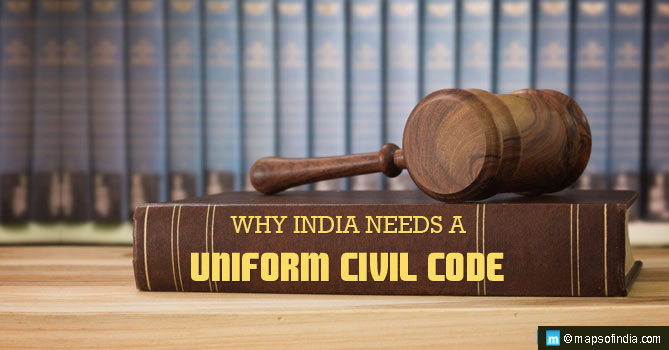
The Uniform Civil Code (UCC) is another debatable issue that may be in the Union government’s pipeline. Article 44 of the Constitution of India states that the Uniform civil code comes under the Directive Principles of State Policy.
What is the Uniform Civil Code?
The Uniform Civil Code (UCC) in India proposes to replace the personal laws based on the scriptures and customs of each significant religious community in the country with a standard set governing every citizen.
Is there a provision in the Indian Constitution for Uniform Civil Code (UCC)?
The Constitution has a provision for the Uniform Civil Code in Article 44 as a Directive Principle of State Policy, which states that “The State shall endeavour to secure for the citizens a uniform civil code throughout the territory of India.”
As of now, Goa is the only state in India which has a uniform civil code.
What is the aim of the Uniform Civil Code?
The Central government is likely to table the Uniform Civil Code (UCC) in the Parliament soon. It was speculated that the Modi government might present UCC in December 2019.
Here is what the UCC is aimed at:
- To provide equal status to all citizens in a secular democratic republic irrespective of the prevailing civil and personal laws for its citizens from different religions, class, caste, gender, etc.
- To promote gender parity since personal laws of almost all religions have been observed to be mostly discriminatory towards women. Men are usually granted upper preferential status in matters of succession and inheritance. Aggrieved women usually make the demand for UCC Uniform civil code as they envision it will bring both men and women at par.
- To accommodate the aspirations of the young population whose social attitudes and aspirations are shaped by universal and global principles of equality, humanity, and modernity.
- To support the national integration as with the implementation of the Uniform Civil Code, all citizens of the country will share the same set of personal laws.
How could the Uniform Civil Code be another CAA in the waiting?
After passing the contentious Citizenship Amendment Act Bill, people have come on the road to show their disapproval. The stir against the controversial Citizenship law (CAA) is not taking the name to die. As such, this might not be the right time to present the UCC. If the Uniform Civil Code is passed, then fierce protests may erupt again in different communities.
Here are some of the difficulties that UCC will face in India:
There might be some practical hurdles in implementing the UCC due to diversity in India.
- With UCC, there is a larger perception that it is aimed at encroachment on religious freedom. Religious communities will not easily accept changes in the way of their practices.
- The UCC is also seen as the state’s interference in the personal matters of its citizens who are already granted the right to religious freedom by the Constitution. As such, UCC is going to be a susceptible and tough task.
Who founded UCC first?
In reality, personal laws were first introduced during the British Raj for the Hindus and Muslims. The demand for a uniform civil code was first raised by some women activists in the early twentieth century to make women more powerful. The demand for Uniform Civil Code was also made by Jawaharlal Nehru, along with some women activists. Still, due to the opposition from the Muslim members, it was added in the Directive Principles.
How the Shah Bano case aggravated the need for UCC
The Shah Bano divorce case was another step towards the Uniform Civil Code. In the Shah Bano case, she sought maintenance from her husband after the divorce. The local court favoured Shah Bano and forced her husband to grant maintenance. Then her husband challenged this verdict and moved the case to the Supreme Court. The apex court’s judgment went in favour of Shah Bano in 1985 under the “maintenance of wives, children and parents” provision (Section 125) of All India Criminal Code, which applied to all the citizens of the country despite religion.
Section 125 scraps
The Criminal Code was considered as a threat to the Muslim Personal Law. The think tank of Muslims believed that their communal identity would be in danger if the judiciary dictated their personal laws.
Everything got settled when the Muslim Women’s Protection of Rights to Divorce was passed in 1986, which declared section 125 of the Criminal Procedure Code, not applicable to Muslim women.





